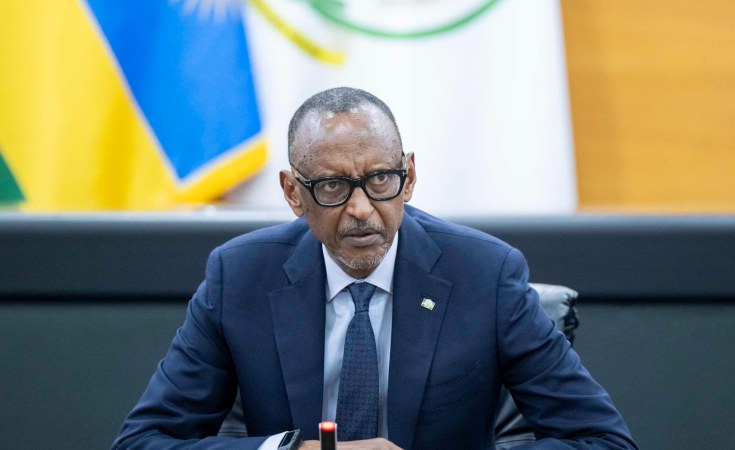President Paul Kagame, on July 4, said Rwanda will not be absent where there is a need for humanitarian action, noting that Rwandans know very well the value of peace.
He was speaking before thousands of Rwandans and friends of Rwanda gathered at the newly renovated ultramodern 45,000 seater Amahoro stadium to mark 30 years of Liberation.
ALSO READ: Rwanda's rebirth, 30 years on
The 30th Liberation Anniversary celebrates the triumph of the RPF-Inkotanyi and its armed wing over the genocidal regime that orchestrated and executed the 1994 Genocide against the Tutsi.
The national celebrations were marked with a military parade by the Rwanda Defence Force (RDF) and Rwanda National Police, cultural dance by the national cultural troupe Urukurereza, and performances by different artistes.
To many Rwandans, it is an occasion to honor the heroes and heroines who lost their lives on the battlefield while fighting for the dream of a free country that the young people and survivors are now living in.
ALSO READ: PICTORIAL: A look at Kigali's changing landscape 30 years later
In his address, Kagame noted that on July 4, Rwandans are better and stronger than ever, and they continue to march forward to the likelihood of the parade by the men and women of defense and security forces.
At the stadium, he reminded people how 30 years ago, it was a site of refuge and rescue as Rwandans flooded from the surrounding neighborhoods to seek safety which they got thanks to the Rwanda Patriotic Army.
The rescue was done countless times all across the country until July 4 when Kigali was captured and genocidal forces fled to neighbouring countries, marking a new beginning to rebuild Rwanda from ashes.
"On July 4th, we express our thanks to those who liberated Rwanda and remember those who gave their lives. Our army and security forces are a powerful symbol of unity and safety," Kagame said.
ALSO READ: Kwibohora 30: Thirty years of rebuilding Rwanda's healthcare from scratch
According to him, it is no accident that Rwandans consistently rate security forces the highest in opinion surveys ranking trust in public institutions, because the army was the first encounter Rwandans had with new authorities.
"The situation in the country was still extremely tense and dangerous yet, our forces did everything in their power to treat all Rwandans with professionalism and humanity, setting a tone for everything that followed. Even today, they remain close to the community and invest in projects that matter to our development such as infrastructure and medical services."
This trust, he said, is the solid foundation upon which the country was rebuilt, however, he noted that remaining principled and consistent was not easy.
"But that product of doing hard things is absolutely beautiful. By nature, Rwandan security posture has been defensive, not offensive. We only act when trouble is brought to us. We prioritize operation and working together."
'Rwanda seeks peace for everyone'
Furthermore, Kagame noted that Rwanda seeks peace for itself and for everyone in the region.
"We know the value of peace just as well as everyone else, maybe even more. Where there is a need for humanitarian action, Rwanda will be absent."
He added: "But the only real answer to any humanitarian crisis is to fix the root causes of the political problem. Humanitarian responses cannot substitute for political solutions."
The Head of State said that if Rwanda had not changed the formula, the country would still be under a United Nations peacekeeping force, divided, and destitute.
"Liberation cannot be imposed on people by force or fear, it is unlocked by the free choice that each citizen makes in their hearts. Because Rwandans, with very few exceptions, have made this choice, our country is at peace and will remain at peace no matter what."
'Notable uniqueness, not understood'
Rwanda's uniqueness only grows more notable with time, Kagame said.
"We have shuttered every negative taboo and assumption about being Rwandan. Our politics is based on accountability and ambition. It is a way for all Rwandans to lead a better life."
He noted that politics is no longer to exclude and harm each other, rather, the people respect the government but do not fear it because it serves all without distinction.
"A few people outside still do not understand Rwandans, some of them even try to spoil what we are building and we see it but all those negative efforts produce no results, they are just words on the internet, a statement somewhere, in different high offices with no power over us at all."
"The values Rwandans have, are now part of us, there is nobody and nothing powerful enough to take away that from us."
He concluded saying that the end point of the liberation struggle was to build a state in which everyone is valued and citizens are always at the center of government action.
He added that Rwandans must remain vigilant despite the huge strides made towards that mindset.


